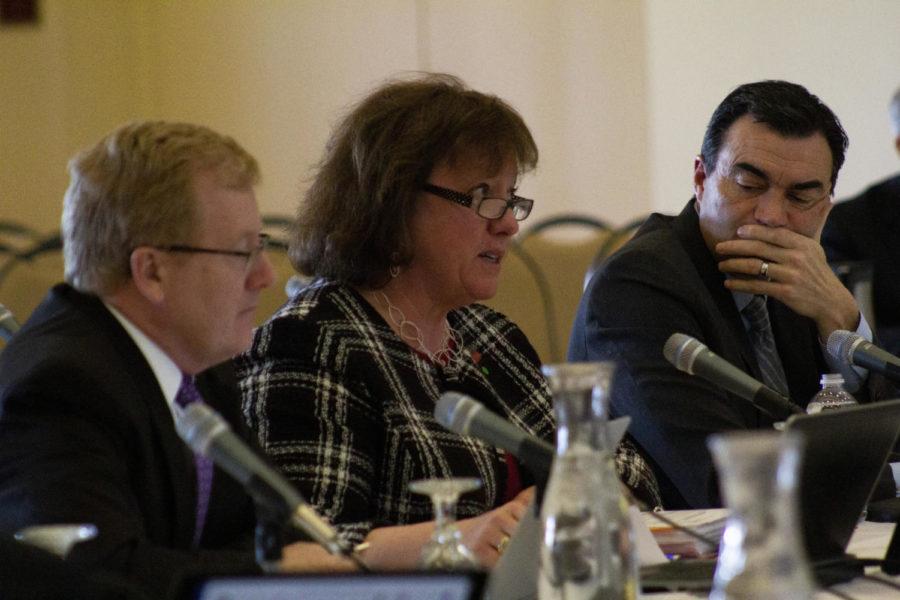Board of Regents call for special meeting, make tuition proposals
Kennedy DeRaedt/Iowa State Daily
Pam Cain (middle), interim senior vice president and university secretary from the division of finance at Iowa State, talks about the register of Iowa State University capital improvement business transactions. Board of Regents held a meeting on Feb. 27 in the Reiman Ballroom at the Alumni Center to hear from the property and facilities committee, the investment and finance committee, the academic affairs committee, campus and student affairs committee, audit and compliance committee and University of Iowa hospitals and clinics committee.
April 29, 2019
The Board of Regents released its tuition proposals to be decided at Wednesday’s special meeting.
The proposed rates would increase resident undergraduate by 3.9 percent and non-resident undergraduate tuition by 4.9 percent, according to the meeting agenda. For graduate students this increase would be 4.9 percent for both resident and non-resident students.
The proposal also increases mandatory fees for undergraduates by 2.4 percent and by 2.5 percent for graduate students.
Tuition and fee increases at Iowa State were larger than increases at Iowa and the University of Northern Iowa, which did not increase its graduate or undergraduate tuition and fees at all.
The rates for Iowa State undergraduate tuition were based on a formula decided in November by the board. The formula sets a 5-year tuition model that has a 3 percent base increase and up to an additional 2 percent increase based on the Higher Education Price Index and state appropriation levels.
The board could not make a decision on tuition rates at its usual meeting time in April due to uncertainty behind the state Legislature’s final funding levels to the regents. The Legislature made its final appropriations decision Saturday before it adjourned for the year, choosing to provide $6 million less than Gov. Kim Reynolds’ request of $18 million.
The $12 million increase was first proposed in the Republican-led Iowa Senate, which gave its recommendation shortly after the House passed an increase of $15.9 million. Both proposals would increase the undergraduate tuition rate for resident students above 3 percent.
“The Board has spent several years looking at tuition and funding of our universities,” said Josh Lehman, senior communications director for the Board of Regents. “There are three main segments of funding — tuition, state appropriations, and savings/reallocations. The Board believes that those three must be looked at collectively, not individually. The total resources needed by the university in one year is the critical number, and finding the right mix of those resources is the challenge.”
The tuition increases will continue a trend over the last 20 years in Iowa of tuition making an increasing portion of regent funding compared to state appropriations.
The Regents will hold its “telephonic meeting” at 2 p.m. at the Board of Regents Office in Urbandale, Iowa, according to a press release.







